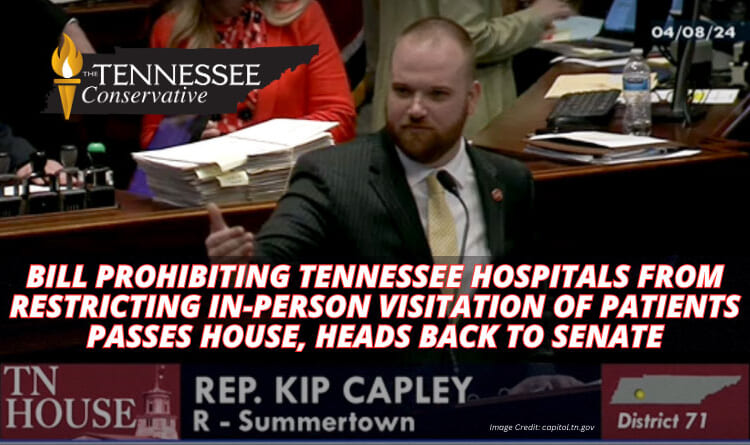Image Credit: capitol.tn.gov
The Tennessee Conservative [By Paula Gomes] –
A Tennessee bill prohibiting hospitals from restricting the in-person visitation rights of patients passed on the House floor on Monday and now heads back to the Senate.
House Bill 1883 (HB1883), sponsored by Representative Kip Capley (R-Summertown-District 71) was passed as amended 75 to 16 with 1 Representative declining to vote.
The General Assembly website recorded the vote as follows:
Representatives voting aye were: Alexander, Barrett, Baum, Boyd, Bricken, Bulso, Burkhart, Butler, Capley, Carr, Carringer, Cepicky, Cochran, Crawford, Darby, Davis, Doggett, Eldridge, Faison, Fritts, Gant, Garrett, Gillespie, Glynn, Grills, Hale, Haston, Hawk, Hazlewood, Helton-Haynes, Hicks G, Hicks T, Hill, Holsclaw, Howell, Hurt, Jernigan, Johnson C, Keisling, Kumar, Lafferty, Lamberth, Leatherwood, Littleton, Lynn, Marsh, Martin B, Martin G, McCalmon, Miller, Moody, Moon, Powers, Ragan, Raper, Reedy, Richey, Rudd, Rudder, Russell, Shaw, Sherrell, Slater, Sparks, Stevens, Terry, Todd, Vaughan, Vital, Warner, White, Williams, Wright, Zachary, Mr. Speaker Sexton — 75.
Representatives voting no were: Behn, Camper, Chism, Clemmons, Freeman, Hakeem, Harris, Hemmer, Johnson G, Love, McKenzie, Mitchell, Parkinson, Pearson, Powell, Thompson — 16.
Representatives present and not voting were: Hulsey — 1.
The legislation protects the rights of patients to receive in-person visits from those “designated to make healthcare decisions under a durable power of attorney for health care” and states that hospitals “shall make a reasonable effort to ensure that each visit is a minimum of one hour in duration” for each day, during visiting hours, that the patient is hospitalized.
The right to visit patients to evaluate their condition will be upheld by the proposed law even during a “declared emergency.” The amendment states that the visitation right “must not be terminated, suspended, waived, or otherwise limited upon the declaration of a disaster or emergency by the governor or the governor’s designee, or by another individual or entity acting on behalf of this state or a political subdivision of this state.” Hospitals will be permitted to require those holding the power of attorney to comply with “non-invasive health and safety protocols.”
The companion Senate Bill 1641 (SB1641), sponsored by Senator Mark Pody (R-Lebanon-District 17), passed on the Senate floor in a 29 to 3 vote in February.
Because the House adopted a different amendment than the Senate, the bill will have to return to that chamber one more time. It is currently scheduled for the Senate’s Message Calendar for April 10th, 2024.
Governor Bill Lee signed legislation last year that prevents individuals from being left to die alone in medical facilities within the state. According to that law, during times when COVID-19 is a concern, medical care facilities such as hospitals and nursing homes, can no longer restrict patients from having at least one family member or patient representative present, providing the visitor does not test positive for Covid and is not showing symptoms of any communicable disease.
HB1883/SB1641 is a further attempt to guarantee the rights of patients after Tennesseans were prevented from visiting with loved ones who were made to suffer and perish in hospitals and nursing homes alone.
However, the bill does include a provision allowing for the patient to decline a visit. According to the amendment, a patient may limit the visitation right or notify the healthcare provider “orally or in writing that the principal declines a visit.”
Once bills are passed by both chambers of the General Assembly, they are enrolled and then signed by the speakers of the House and Senate before heading to the governor’s desk. Lee will then sign the bill, allow it to pass into law without his signature, or he can veto the bill. He also has the power to reduce or veto an appropriation in a bill, but vetoes can be overridden by majority vote in the Legislature.
Once the bill makes it to Lee, he has 10 days to act, not including Sundays. Since Lee took office in 2019, he has never used his veto power on a piece of legislation that the Tennessee General Assembly has passed.
About the Author: Paula Gomes is a Tennessee resident and reporter for The Tennessee Conservative. You can reach Paula at paula@tennesseeconservativenews.com.













